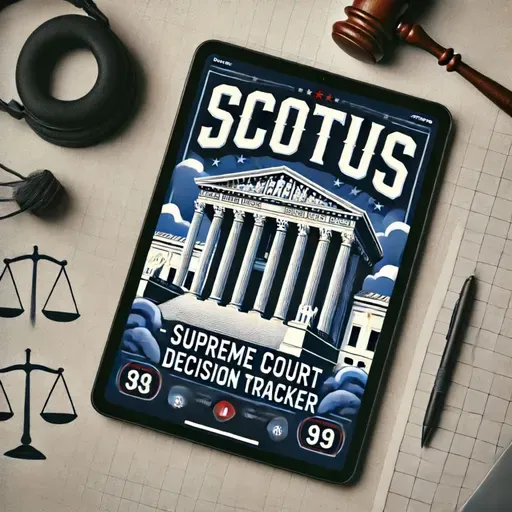
29 August 2025
Headline: "Supreme Court's Rulings Reshape Science Funding, Online Privacy, and Workplace Discrimination Laws"
Supreme Court Tracker - SCOTUS News
About
This week, the US Supreme Court has made headlines with several major developments shaping law, policy, and society. Justices most recently issued a narrow 5-4 decision in National Institutes of Health v. American Public Health Association, which leaves over $780 million in NIH grants unavailable. The ruling is already causing a chilling effect in the research community, forcing academic centers and scientists nationwide to reconsider ongoing and future projects. Debate continues about the broader implications for federal science funding, with research advocates arguing that the decision threatens progress and public health while supporters frame it as a necessary check on administrative authority.
The court also blocked an emergency appeal aimed at preventing Mississippi's controversial age assurance law from going into effect. This law mandates age verification for users of social networks like Bluesky and Mastodon, forcing companies either to comply with technical requirements or halt service altogether. Critics argue the move compromises online privacy and internet freedom, while supporters say it protects children and better aligns with legislative intent.
Justice Alito made news for filing his 2024 financial disclosure, drawing attention to the increased scrutiny of justices’ outside income and investments. Meanwhile, the Supreme Court’s recent employment law rulings made waves in lower federal courts. The Fourth Circuit this week highlighted the impact of Muldrow v. City of St. Louis, a decision in which the Supreme Court broadened the definition of adverse employment action under Title VII. Now, employees can bring discrimination claims for detrimental transfers or other workplace changes even without pay cuts or formal demotions, a shift predicted to trigger more workplace litigation.
Looking ahead, listeners should know that the Supreme Court is poised to hear Robinson v. United States, a challenge that could potentially reshape the National Firearms Act and American gun rights. Experts caution that this could be one of the most consequential Second Amendment cases in decades. The future of voting rights also remains a prominent topic, with Erwin Chemerinsky writing about growing uncertainty around electoral protections and Supreme Court doctrine.
For those tracking major employer and religious freedom cases from the term, Trump v. CASA imposed new limits on district court injunctions, making it harder for plaintiffs to obtain sweeping orders against federal policies. Catholic Charities Bureau Inc v. Wisconsin Labor and Industry Review Commission clarified that government religious exemptions cannot prefer one faith over another, broadening eligibility for religious organizations and schools.
Finally, legal observers and policymakers are dissecting the Court's use of its “shadow docket,” the growing practice of issuing quick, often unsigned decisions that can reverse lower courts or freeze major policy changes overnight. Opinions remain divided about whether this streamlines justice or undermines transparency and trust in the highest court.
Thanks for tuning in, and remember to subscribe. This has been a Quiet Please production, for more check out quiet please dot ai.
For more http://www.quietplease.ai
Get the best deals https://amzn.to/3ODvOta
The court also blocked an emergency appeal aimed at preventing Mississippi's controversial age assurance law from going into effect. This law mandates age verification for users of social networks like Bluesky and Mastodon, forcing companies either to comply with technical requirements or halt service altogether. Critics argue the move compromises online privacy and internet freedom, while supporters say it protects children and better aligns with legislative intent.
Justice Alito made news for filing his 2024 financial disclosure, drawing attention to the increased scrutiny of justices’ outside income and investments. Meanwhile, the Supreme Court’s recent employment law rulings made waves in lower federal courts. The Fourth Circuit this week highlighted the impact of Muldrow v. City of St. Louis, a decision in which the Supreme Court broadened the definition of adverse employment action under Title VII. Now, employees can bring discrimination claims for detrimental transfers or other workplace changes even without pay cuts or formal demotions, a shift predicted to trigger more workplace litigation.
Looking ahead, listeners should know that the Supreme Court is poised to hear Robinson v. United States, a challenge that could potentially reshape the National Firearms Act and American gun rights. Experts caution that this could be one of the most consequential Second Amendment cases in decades. The future of voting rights also remains a prominent topic, with Erwin Chemerinsky writing about growing uncertainty around electoral protections and Supreme Court doctrine.
For those tracking major employer and religious freedom cases from the term, Trump v. CASA imposed new limits on district court injunctions, making it harder for plaintiffs to obtain sweeping orders against federal policies. Catholic Charities Bureau Inc v. Wisconsin Labor and Industry Review Commission clarified that government religious exemptions cannot prefer one faith over another, broadening eligibility for religious organizations and schools.
Finally, legal observers and policymakers are dissecting the Court's use of its “shadow docket,” the growing practice of issuing quick, often unsigned decisions that can reverse lower courts or freeze major policy changes overnight. Opinions remain divided about whether this streamlines justice or undermines transparency and trust in the highest court.
Thanks for tuning in, and remember to subscribe. This has been a Quiet Please production, for more check out quiet please dot ai.
For more http://www.quietplease.ai
Get the best deals https://amzn.to/3ODvOta